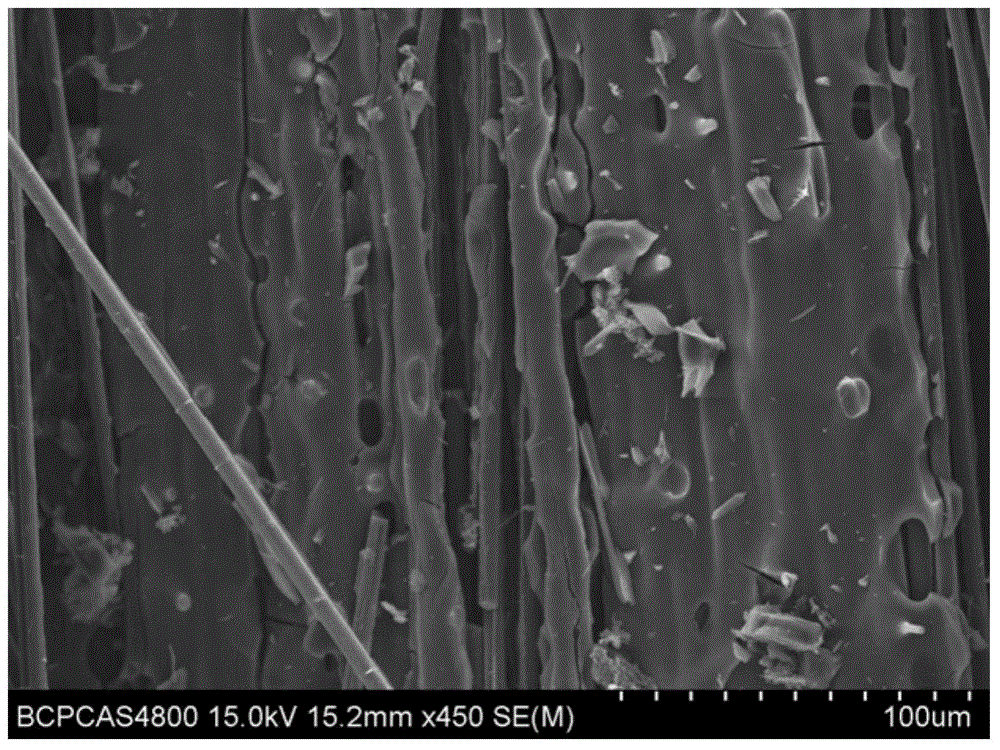Flame-retardant modified carbon fiber prepreg and composite material product
A technology of carbon fiber prepreg and flame-retardant materials, which is applied in the field of structural composite materials, can solve the problems of changing the molding process, difficult process, poor processability, etc., and achieve the effects of improving toughness, inhibiting air diffusion, and inhibiting combustion
- Summary
- Abstract
- Description
- Claims
- Application Information
AI Technical Summary
Problems solved by technology
Method used
Image
Examples
Embodiment 1
[0034] The implementation process of the technical solution of the present invention is as follows:
[0035] (1-1) Disperse 3 g of silica nanoparticles or nano-layered silicate clay or halloysite nanotubes in N,N-dimethylformamide or N,N-dimethylacetamide, three The diameters or layer thicknesses are 50nm, 70nm and 35nm respectively, and then take 75g of phenolphthalein-modified polyaryletherketone (PEK-C) or polyethersulfone (PES-C) and 25g of polyphenylphosphonic acid diphenyl sulfone Dissolve the ester evenly in the dispersion liquid, and ultrasonically disperse to obtain a uniform dispersion liquid; cast the solution into a film, control the final film thickness at 18 μm or 32 μm by the amount of the solution, blow and dry at 80°C for 1 hour, and then Vacuum dry at 100°C for 10 hours or 15 hours, remove the film to obtain a flame-retardant modified film, and use thick needles with a diameter of 0.5 mm to pierce a needle hole every 5 mm on the film;
[0036] (1-2) Get the ...
Embodiment 2
[0042] The implementation process of the technical solution of the present invention is as follows:
[0043] (2-1) Dissolve 17g of phenolphthalein-modified polyarylether ketone or phenolphthalein-modified polyarylether sulfone or polyethylene terephthalate into 83g of N,N-dimethylformamide, with a mass percent concentration of 17 %, then add 0.35g multi-walled carbon nanotubes with a diameter of 25nm and 0.5g carbon-60, add 0.1g polyvinylpyrrolidone to improve the dispersion of carbon nanomaterials, after adding, ultrasonically mix evenly, and set aside. Use the spacer to control the thickness of the coated solution liquid film to 100 μm or 150 μm, then dry it in an oven, remove the film and punch holes mechanically to obtain a flame-retardant modified toughened film with a thickness ranging from 15 μm to 20 μm or 24 to 30 μm .
[0044] (2-2) Lay the flame-retardant modified films obtained above on benzoxazine (BOZ) resin pre-impregnated carbon fiber cloth one by one. The fa...
Embodiment 3
[0046] The implementation process of the technical solution of the present invention is as follows:
[0047] (3-1) Heat and dissolve 18g of polyetherimide or 17g of polyphenylene sulfide in DMF to form a solution with a concentration of 18% or 17% by mass, and add 7g or 4g of polymer flame retardant or 5.5g of Small molecule flame retardant, the polymer flame retardant is polyphenyl sulfone diphenyl phosphonate or nitrogen-containing heterocyclic triphenylphosphine oxide polyarylether or tribromophenol modified novolac resin, small molecule flame retardant The fuel is octabromoether or decabromodiphenyl ether or N,N-bis(5,5-dimethyl-4-substituted phenyl-2-oxo-1,3,2-dioxaphosphorinyl )-4,4'-p-diphenylmethane or N,N-bis(5,5-dimethyl-4-substituted phenyl-2-oxo-1,3,2-dioxaphosphorinyl )-4,4'-p-Diphenylsulfone, dissolve and stir evenly, cast to form a film, control the solution amount to control the thickness of the final dried film to be 20 μm or 28 μm, dry to obtain a flame-reta...
PUM
| Property | Measurement | Unit |
|---|---|---|
| Thickness | aaaaa | aaaaa |
| Areal density | aaaaa | aaaaa |
| Aperture | aaaaa | aaaaa |
Abstract
Description
Claims
Application Information
 Login to View More
Login to View More - R&D Engineer
- R&D Manager
- IP Professional
- Industry Leading Data Capabilities
- Powerful AI technology
- Patent DNA Extraction
Browse by: Latest US Patents, China's latest patents, Technical Efficacy Thesaurus, Application Domain, Technology Topic, Popular Technical Reports.
© 2024 PatSnap. All rights reserved.Legal|Privacy policy|Modern Slavery Act Transparency Statement|Sitemap|About US| Contact US: help@patsnap.com









